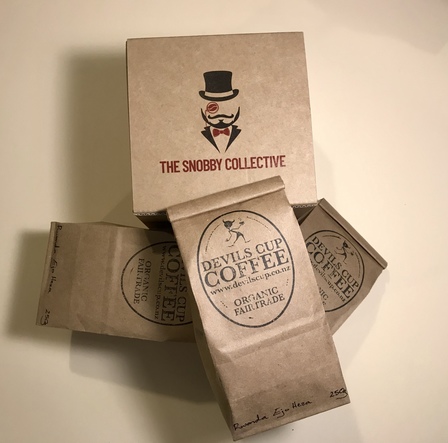August 2019
August 2019: Feature number 10.
We first met Kevin from Devils Cup Coffee back in November 2018 at The Bank Room in Patea, South Taranaki.
Our discussion lead us to featuring coffee produced by a womens collective.
As with all of the coffee roasted by Devils cup, this lot was sourced by Trade Aid. It was so new that we needed to wait for the full trip report to be prepared before we could schedule the feature. We owe a huge debt of thanks to Justin and the Trade Aid team for their part in this, we really couldn't have done it without you.
During August we explored:
The Producer:
Ejo Heza is a women’s only producer group within the Kopakama Co-Operative. Founded in 2008 by a group of 300 women, many of whom are widows or orphans of the 1994 genocide and needed to provide for their families alone. In 2009 they purchased communal land and coffee trees, naming it Ejo Heza (“A beautiful tomorrow”) in recognition of its goal to provide a brighter future through unity and reconciliation, within a community torn apart by the events of 1994. The group brings women together two days per week to work and in doing so allows them to talk with and support each other through personal challenges that they would otherwise face and struggle with alone. In addition, Ejo Heza takes an active role in empowering women. Members benefit from gender equality training and by gaining more control over their family finances and earnings by selling and directly receiving payment for their own coffee. With the additional income, members now have the ability to cover school expenses for their children and have made other household improvements such as mattresses, a reality that may have been previously unattainable.
The CO - OP (An extended 2 part feature)
To recover from the aftermath of the 1994 events, there began a major domestic and international focus to rebuilding Rwandan society and its economy by the early 2000’s the Rwandan government was in a position to fund initiatives to rebuild the local coffee industry and in 2004 awarded a contract to a UK based NGO to support creation of Co-Ops with the goal of being able to sell higher quality coffee to the export market. As funding came to an end, Co-Ops including Kopakama (founded in 2005) were helped to transition into self management. Kopakama is now governed by a board comprised of Co-Op members and voting on key issues is open to all Co-Op members at the Co-Ops annual general assembly. The primary objective of Kopkama is to provide its members with higher and more stable prices for its coffee. This is achieved through improving the quality of the coffee the members produce. Improving the quality of life for its members and development of coffee processing infrastructure has assisted the rebuilding of the community in post genocide Rutsiro district, reducing processing costs and developing an additional source of income.
Part 2:
Kopakama has successfully created many benefits for it Co-Op members, many benefits extend and enrich the lives of the wider community, such as: - A gravity fed water system serving members and the wider community - A training program run by its own agronomists which has helped farmers increase coffee yields and attain better quality - Ownership of two coffee washing stations - Support to obtain organic certification, therefore attaining higher prices for exported coffee - Installation of electricity, paid for by the fair trade community premium - Construction of the Co-Ops own dry mill, allowing members to process their own coffees, while earning extra revenue by providing contract milling to other farmers in Western Rwanda - Access to loan finance, allowing farmers to increase production and alternative revenue sources (such as cows for regular milk production and manure). As Rwandan law forbade Co-Op unions to form in more than one region, Kopakama and four other Co-Ops formed Misozi Coffee, a green bean exporter. From their location on the Eastern shores of Lake Kivu, coffee from Kopakama is sold directly by Misozi to buyers such as Trade Aid in New Zealand, whom they have partnered with since 2018.
|
© Copyright Derelict Coffee Roasters |


